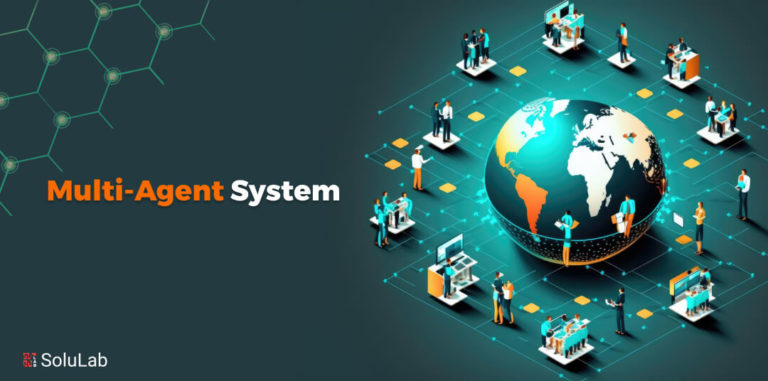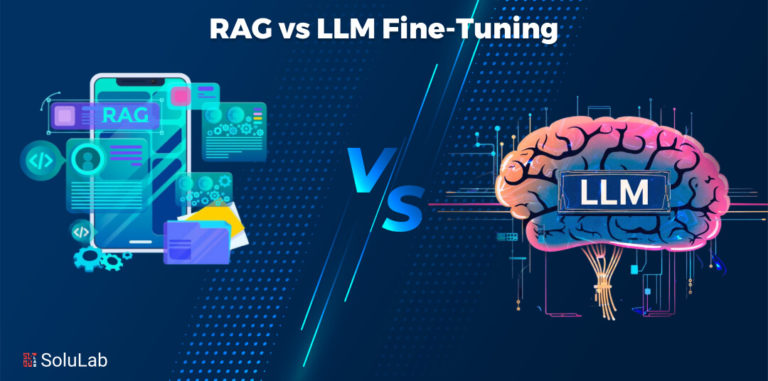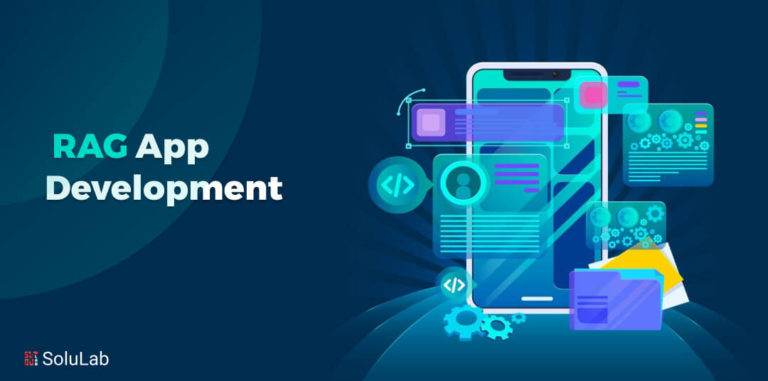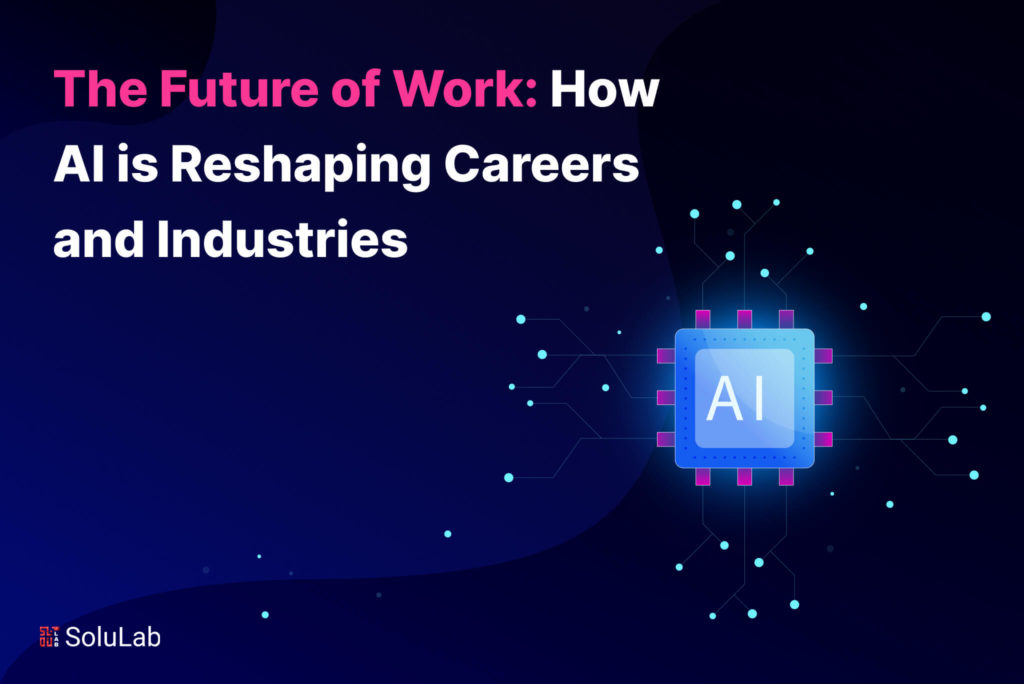
The rapid advancement of technology, particularly in the realm of Artificial Intelligence (AI), has become a defining force in reshaping the landscape of work. As we navigate through the intricacies of this digital age, it is crucial to understand how AI is influencing careers and industries, creating both challenges and unprecedented opportunities. This blog explores the rise of AI development services.
Current Landscape of Work
In order to grasp the transformative impact of AI in workplace, it’s essential to first understand the backdrop against which this change is unfolding. Traditionally, job structures adhered to well-defined roles and hierarchical frameworks. Employees operated within the confines of established norms, executing tasks that were often routine and predictable.
However, as technology advanced in the pre-AI era, a shift began to occur. The advent of computers and digital systems laid the groundwork for a more interconnected and information-driven work environment. This period of transition witnessed the gradual integration of technology into various industries, altering the nature of tasks and skill requirements.
Fast forward to the present, and we find ourselves in a digital age where the pace of change has accelerated exponentially. The traditional 9-to-5 model is no longer the sole paradigm, with remote work and flexible schedules becoming more prevalent. The current landscape of work is characterized by a fusion of human expertise and technological capabilities, setting the stage for the prominent role that AI is poised to play.
The need for adaptation is palpable. Jobs that were once considered secure are now subject to automation, and the demand for new skill sets is on the rise. The dichotomy between routine, rule-based tasks and those requiring creativity and complex problem-solving is becoming more pronounced.
In navigating this landscape, professionals are confronted with the imperative to upskill and reskill to remain relevant. The dichotomy between routine, rule-based tasks and those requiring creativity and complex problem-solving is becoming more pronounced. The adaptability of the workforce has become a critical factor in determining individual and organizational success.
As we dissect the current state of work, it becomes evident that the intersection of human capabilities and technological advancements is reshaping the very essence of what we consider traditional employment. This sets the stage for a more in-depth exploration of how AI, as a transformative force, is influencing and redefining careers across diverse industries.
AI in Specific Industries
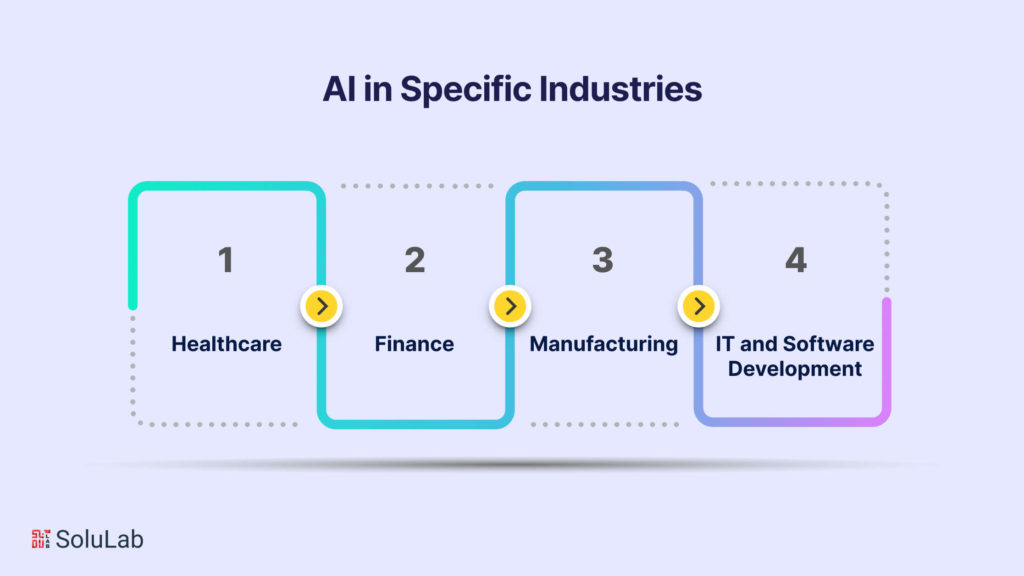
The transformative influence of Artificial Intelligence (AI) extends its tendrils across various industries, redefining processes, enhancing efficiency, and unlocking new possibilities. As we embark on a sector-specific exploration, it becomes evident that the impact of AI is nuanced, contributing uniquely to the evolution of healthcare, finance, manufacturing, and IT/software development.
-
Healthcare
In the realm of AI use cases in healthcare, it has emerged as a powerful ally in diagnosis, treatment, and patient care. Machine learning algorithms can analyze vast datasets, aiding in the identification of patterns that might elude human observation. This not only expedites the diagnostic process but also contributes to personalized treatment plans. AI-powered robotics are also making strides in surgical procedures, augmenting the precision of operations.
-
Finance
The financial sector has witnessed a paradigm shift with the integration of AI. Automated systems analyze massive datasets at unprecedented speeds, facilitating more accurate AI in risk management and investment strategies. Chatbots powered by AI have become common in customer service, providing instantaneous responses and streamlining financial interactions. The predictive capabilities of AI use cases in finance also play a pivotal role in AI in fraud detection and cybersecurity.
-
Manufacturing
AI-driven robotics has revolutionized the manufacturing landscape. Automation not only enhances production efficiency but also contributes to a reduction in errors and waste. Predictive maintenance, enabled by AI algorithms, ensures that machinery is serviced proactively, minimizing downtime. This integration of AI in manufacturing is not about replacing human workers but optimizing their roles, leading to a more efficient and precise manufacturing process.
-
IT and Software Development
In the realm of IT and software development, AI has become an integral part of the creative process. AI tools assist in coding, identifying bugs, and even generating creative solutions. Machine learning algorithms analyze user behavior, enabling the development of more user-centric applications. This collaboration between human creativity and AI-driven efficiency is propelling innovation in the tech industry.
While these sectors showcase the positive impact of AI, it is crucial to acknowledge the challenges and ethical considerations that accompany this integration. The potential biases in algorithms and the need for robust data privacy measures require diligent attention to ensure that the benefits of AI in different industries are harnessed responsibly.
Changing Skill Sets
The pervasive influence of Artificial Intelligence (AI) on industries necessitates a profound shift in the skill sets demanded of the modern workforce. As we navigate this transformative era, it becomes increasingly clear that adaptability and continuous learning are not merely advantageous; they are imperative for professional survival and success.
In the wake of AI Automation integration, certain skills have risen to prominence. Beyond the technical acumen required to interact with AI systems, soft skills such as critical thinking, problem-solving, and creativity have become invaluable. The ability to navigate ambiguity and complex situations, traits inherently human, is now a sought-after asset.
Adaptability, often considered a hallmark of a resilient workforce, has taken on renewed significance. Professionals must be agile in their approach, ready to learn and unlearn as technology evolves. The traditional concept of a static skill set has given way to a more fluid and dynamic model where the capacity to acquire new skills is as crucial as the existing ones.
Reskilling and upskilling initiatives have become central to empowering individuals to thrive in the AI-driven landscape. Continuous learning platforms, online courses, and workshops are essential components of this paradigm shift, ensuring that professionals stay abreast of technological advancements and emerging industry trends.
Moreover, the ability to collaborate with AI systems is emerging as a vital skill. Human-AI collaboration is not just about understanding how to operate AI tools; it involves leveraging AI capabilities to augment human decision-making. This collaborative dynamic opens avenues for enhanced efficiency and innovation across diverse industries.
In this transformative phase, where the contours of job roles are evolving, individuals and organizations alike are faced with the challenge of navigating this new skill terrain. Embracing a mindset of perpetual learning and being receptive to change is instrumental in thriving in this AI era.
The changing skill sets demanded by AI in industries are not a threat but an opportunity for growth and evolution. By acknowledging the significance of both technical and soft skills, professionals can position themselves as contributors to, rather than casualties of, the AI-driven workforce. As we delve deeper into the impact across industries, we will uncover how these evolving skill requirements shape the dynamics of various professions in the ever-evolving landscape of work.
The Rise of Artificial Intelligence
In the ever-expanding landscape of industries, the rise of Artificial Intelligence (AI) has emerged as a revolutionary force, fundamentally altering the way tasks are conceived, executed, and managed. As we delve into this transformative wave, it is crucial to dissect the multifaceted impact of AI across various sectors.
AI’s role is not confined to a specific niche; rather, it permeates diverse industries, leaving an indelible mark on their operational frameworks. One of the key elements of this transformation is automation, where routine and repetitive tasks are seamlessly executed by AI systems. This not only enhances efficiency but also frees up human resources to focus on more intricate and value-driven aspects of their roles.
The integration of AI is most conspicuous in sectors where data analysis and pattern recognition play a pivotal role. In healthcare, for instance, AI algorithms can analyze vast datasets to identify potential trends and correlations, aiding in diagnostics and treatment plans. The financial sector benefits from AI’s ability to process vast amounts of data rapidly, facilitating more accurate risk assessments and investment strategies.
Manufacturing has undergone a paradigm shift with the implementation of AI-driven robotics, streamlining production processes and enhancing precision. In the realm of IT and software development, AI has become an indispensable tool for coding assistance, bug detection, and even generating creative solutions.
This surge in AI adoption is not solely about task automation; it’s also about augmentation. AI systems can complement human capabilities, offering insights, suggestions, and support in decision-making processes. This collaborative dynamic between human workers and AI technologies marks a departure from the traditional narrative of technology replacing jobs, emphasizing instead a synergy that leads to higher productivity and innovation.
The transformative power of AI is not without its challenges, however. As industries embrace these technologies, questions of bias in algorithms, data privacy concerns, and ethical considerations loom large. Addressing these issues is pivotal in ensuring that the integration of AI aligns with ethical standards and societal values.
Job Displacement vs. Job Creation
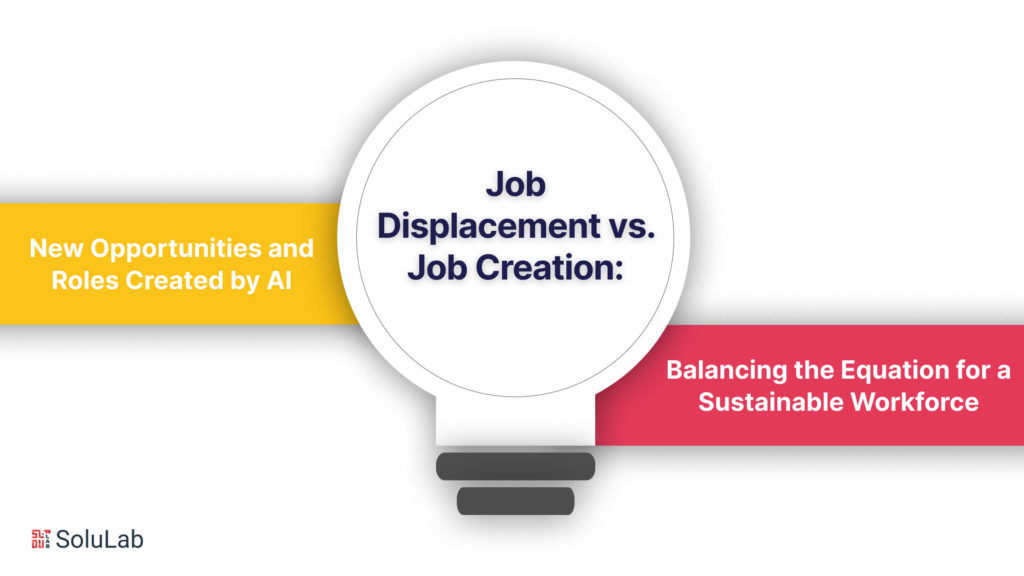
The integration of Artificial Intelligence (AI) into various industries has sparked legitimate concerns about job displacement. As automation takes center stage, routine tasks that were once carried out by human workers are increasingly being performed by AI-driven systems. This transition has led to apprehensions about a potential decline in job opportunities for traditional roles.
It is crucial, however, to approach these concerns with nuance. While certain routine and repetitive tasks may indeed be automated, the overarching impact on overall employment is more complex. The key lies in acknowledging the shifts in job requirements and preparing the workforce for the evolving demands of the digital era.
-
New Opportunities and Roles Created by AI
Contrary to the narrative of job loss, the rise of AI has also ushered in a wave of new opportunities and roles. The implementation of AI technologies necessitates a workforce equipped with skills in AI development, maintenance, and oversight. Consequently, the demand for professionals with expertise in data science, machine learning, and AI ethics has surged.
Moreover, AI has stimulated the creation of entirely new job categories. Positions dedicated to managing and optimizing AI systems, ensuring ethical AI practices, and devising innovative solutions are emerging. The transition to an AI-centric workforce is, in essence, reshaping the job market rather than diminishing its scope.
-
Balancing the Equation for a Sustainable Workforce
The challenge is to strike a balance between the jobs automated by AI and the new opportunities it creates. This involves a strategic and concerted effort from policymakers, businesses, and educational institutions. Initiatives for reskilling and upskilling the existing workforce become pivotal, enabling individuals to adapt to the changing job landscape.
Moreover, fostering an environment that encourages entrepreneurship and the creation of AI-centric startups can contribute to job creation. The symbiotic relationship between job displacement and job creation requires a forward-thinking approach that recognizes the evolving nature of work in the AI era.
By aligning educational curricula with the demands of AI-driven industries and investing in training programs, societies can better equip their workforce for the jobs of the future. Proactive measures to identify areas where AI can augment human capabilities rather than replace them are crucial for building a sustainable and inclusive job market.
Challenges and Ethical Considerations
The integration of Artificial Intelligence (AI) into our professional landscape comes with a set of challenges and ethical considerations that demand careful consideration. One prevalent challenge is the existence of biases within AI algorithms. These biases can inadvertently perpetuate inequalities if not addressed rigorously. Recognizing and mitigating bias in AI systems is imperative to ensure fair and unbiased outcomes across diverse populations.
Privacy concerns also loom large as AI becomes more pervasive. The collection and utilization of vast amounts of data for AI applications raise questions about the security and confidentiality of personal information. Striking a balance between leveraging data for AI advancements and safeguarding individual privacy is an ongoing challenge that necessitates robust regulatory frameworks and ethical guidelines.
Moreover, the ethical development and deployment of AI demand vigilant oversight. Ensuring that AI technologies adhere to ethical standards is crucial to prevent unintended consequences. Ethical considerations extend to issues such as the responsible use of AI in decision-making processes, particularly in contexts where human lives or significant societal impacts are at stake.
The Future Outlook
As we peer into the future, the symbiotic relationship between humans and AI is poised to deepen. Predictions for the next decade suggest a continued integration of AI into various facets of our professional lives. AI is expected to evolve from being a tool that complements human capabilities to a strategic partner that augments and enhances our decision-making processes.
The future outlook also emphasizes the importance of adaptability. Individuals and businesses that actively engage in upskilling and reskilling initiatives will be better positioned to harness the benefits of AI. Lifelong learning will not only be a personal and professional asset but a prerequisite for thriving in a job market that continues to undergo rapid transformations.
Collaboration between humans and AI is anticipated to be more nuanced, with a focus on tasks that leverage the strengths of both. AI may handle routine and repetitive tasks, allowing humans to concentrate on activities that require emotional intelligence, creativity, and complex problem-solving—traits that uniquely define our humanity.
Concluding Remarks
In conclusion, the challenges posed by AI must be met with proactive solutions and ethical frameworks. The future outlook invites us to envision a world where AI is harnessed responsibly, and its transformative potential is leveraged to create a work environment that is not only technologically advanced but also human-centric. As we navigate this future, the key lies in embracing change, fostering adaptability, and actively participating in shaping a harmonious coexistence with AI in the professional realm.
In this ever-evolving landscape where AI in the workplace is a defining force, the concluding vision is one of harmonious coexistence. The challenges presented by AI should be viewed as opportunities for growth, innovation, and a redefinition of professional roles. As we move forward, a collaborative approach between humans and AI will be paramount, emphasizing the unique strengths each brings to the table. By embracing a mindset of continual adaptation, fostering ethical AI practices, and actively participating in shaping the future of work, individuals and organizations can navigate this transformative era with resilience and purpose. The future promises not just technological advancement but a balanced and human-centric integration of AI in the professional realm.
SoluLab, a prominent player in the technology landscape, stands at the forefront of empowering businesses to navigate the dynamic challenges and opportunities presented by AI in the workplace. Through its innovative AI development services, SoluLab is dedicated to creating tailored solutions that align with the evolving needs of industries. By leveraging cutting-edge AI technologies, SoluLab assists organizations in enhancing efficiency, automating routine tasks, and unlocking new dimensions of productivity. Moreover, the company is committed to addressing ethical considerations, and ensuring responsible AI practices that align with societal values. In the realm of AI in different industries, SoluLab’s expertise extends to healthcare, finance, manufacturing, and IT/software development, contributing to the seamless integration of AI into diverse sectors. As industries evolve, SoluLab remains a strategic partner, providing the tools and expertise needed for businesses to thrive in the era of AI-driven transformation.
FAQs
1. How is AI impacting traditional job structures in various industries?
As Artificial Intelligence (AI) continues to advance, it is fundamentally reshaping job structures across industries. Automation, data analysis, and AI-driven robotics are optimizing routine tasks, leading to a shift in traditional roles. However, this evolution is also creating new opportunities and demands for diverse skill sets.
2. What skills are crucial for individuals to thrive in the AI era?
Thriving in the AI era requires a combination of technical and soft skills. Adaptability, critical thinking, and creativity are as essential as technical proficiency. Continuous learning and a proactive approach to reskilling are vital for professionals to stay relevant in an environment where skill requirements are dynamic and evolving.
3. How does AI contribute to collaboration between humans and technology in the workforce?
AI is not about replacing humans but collaborating with them. It augments human capabilities, offering support in decision-making and handling routine tasks. The synergy between human creativity and AI-driven efficiency leads to higher productivity and innovation, defining a collaborative dynamic in the modern workforce.
4. In what specific ways is AI impacting the healthcare sector?
In healthcare, AI is revolutionizing diagnostics, treatment, and patient care. Machine learning algorithms analyze extensive datasets to identify patterns, expediting diagnosis and enabling personalized treatment plans. AI-powered robotics are enhancing precision in surgical procedures, marking a significant advancement in medical practices.
5. What ethical considerations accompany the integration of AI in various industries?
The integration of AI raises ethical concerns, including potential biases in algorithms and data privacy issues. Ensuring responsible AI development company involves addressing these challenges diligently. Industry stakeholders must prioritize ethical standards and societal values to harness the benefits of AI while minimizing risks and safeguarding privacy.




